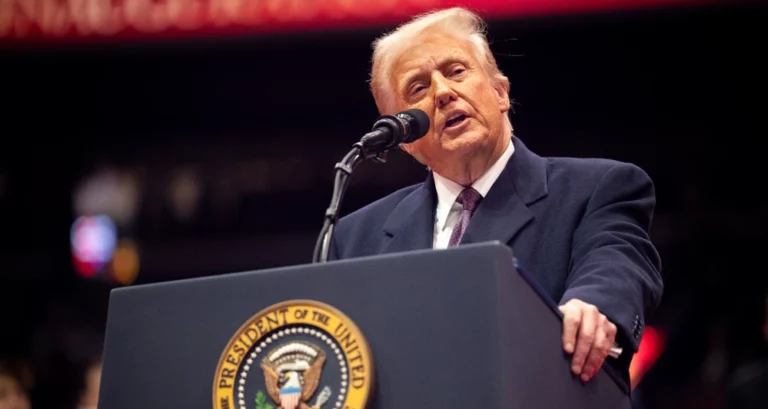
This article was originally published by Radio Free Europe/Radio Liberty and is reprinted with permission.
US President Donald Trump has made sharp criticisms of Ukraine and European nations as diplomats from the United States, Ukraine, Britain, France, and Germany gathered in Geneva for talks on bringing an end to Europe’s largest conflict since World War II.
The meetings in the Swiss lakeside city are focusing on a 28-point plan to stop fighting that has raged since Russia’s full-scale invasion of Ukraine in February 2022.
The plan has not yet been officially disclosed, although key elements have been leaked — sparking Kyiv’s allies to suggest that it is highly tilted in Russia’s favor.
Trump had earlier said the plan was not his final word, suggesting changes could be made to it. But his comments on Truth Social on November 23 indicated frustration with European and Ukrainian positions.
“Ukraine’s ‘leadership’ has expressed zero gratitude for our efforts, and Europe continues to buy oil from Russia,†he wrote in all-caps comments.
Two European Union member states still purchase Russian crude oil: Hungary and Slovakia. NATO-member Turkey also buys Russian crude.
Trump’s comments recalled a heated White House meeting in February, when Vice President JD Vance accused Ukrainian President Volodymyr Zelenskyy of not voicing thanks for massive US military and economic support.
Yet Zelenskyy has often expressed gratitude, such as during a visit to Washington in August.
As the Geneva meetings began, Zelenskyy wrote on social media: “I am awaiting the results of today’s talks and hope that all participants will be constructive. We all need a positive outcome.”
What’s In The Deal?
Many of the terms of the proposed deal require sweeping concessions by Kyiv and appear to mirror many of the Kremlin’s demands — including surrender of Ukraine’s Donetsk and Luhansk regions — known as the Donbas — and Crimea, along with setting limits on the size of its military.
Kyiv would also be required to enact a constitutional prohibition on joining NATO, while restrictions would be put on the Western military alliance itself regarding the stationing of its troops. Financial sanctions on Moscow would also be eased under the plan.
In return, Ukraine would receive some form of “security guarantees,†most notably from the United States, be allowed to join the European Union, and receive some financial benefits. Russia would also be required to withdraw from some Ukrainian areas it currently occupies.
Amid pushback from US lawmakers and foreign allies, Trump on November 22 left open the possibility of changes being made to the plan.
Asked by reporters if his proposal was his “final offer to Ukraine,” Trump said, “No.”
“We’re trying to get it ended. One way or the other, we have to get it ended,” he added.
Ukraine’s European allies, who were not involved in drafting the US plan, have said the proposal requires “additional work.”
In a joint statement, the leaders of Britain, Germany, France, Spain, and Italy, along with top EU officials and the leaders of Japan and Canada, warned that borders “must not be changed by force.” They raised concerns that the proposed limits on Ukraine’s military would leave it vulnerable to future attack.
Democrats, Republicans Push Back
The plan has also received criticism among influential members of Trump’s own Republican party, including a joint statement with rival Democrats that calls for changes in the proposal.
“We will not achieve that lasting peace by offering [Russian President Vladimir] Putin concession after concession and fatally degrading Ukraine’s ability to defend itself,” said the statement, signed by three Democrats, one Republican, and one independent senator.
“History teaches us that Putin only understands strength and will not abide by any agreement unless it is backed by force,” it added.
Veteran Republican Senator Mitch McConnell, a former Senate leader, wrote on X that “rewarding Russian butchery would be disastrous to America’s interests.”
Putin has “spent the entire year trying to play President Trump for a fool,” McConnell added.
Republican Roger Wicker, chairman of the Senate Armed Services Committee, said he is “highly skeptical” the plan will bring about peace.
“Ukraine should not be forced to give up its lands to one of the world’s most flagrant war criminals in Vladimir Putin,” he said in a statement.
US Secretary of State Marco Rubio, who has arrived in Geneva for the talks, denied remarks by Republican Senator Mike Rounds, Democrat Jeanne Shaheen, and independent Angus King that the proposal was not drafted by Washington but was the Kremlin’s “wish list” handed over by the Russians.
“What he [Rubio] told us was that this was not the American proposal. This was a proposal that was received by someone… representing Russia in this proposal. It was given to [Trump diplomatic envoy Steve] Witkoff,” Rounds said, relaying what he said were details of a phone call with Rubio.
Western media outlets have cited sources as saying the document was largely the product of talks between Witkoff and a special envoy for Putin, Kirill Dmitriev.
Rubio, writing on X, insisted the proposal was “authored” by the US administration “based on input from the Russian side. But it is also based on previous and ongoing input from Ukraine.”
Meanwhile, officials in Russia and Ukraine reported on new strikes on November 23.
An 11-year-old girl was among 19 people injured by drone strikes in Ukraine’s Dnipropetrovsk region, said Vladislav Haivanenko, head of the regional military administration.
Moscow’s Vnukovo airport suspended flights as the city’s mayor, Sergei Sobyanin, reported incoming Ukrainian drones.
Zelenskyy has said his country faces “one of the most difficult moments” in its history, warning that it risks losing one of its key allies — Washington — but that Kyiv would not “betray†its own interests in any negotiations.